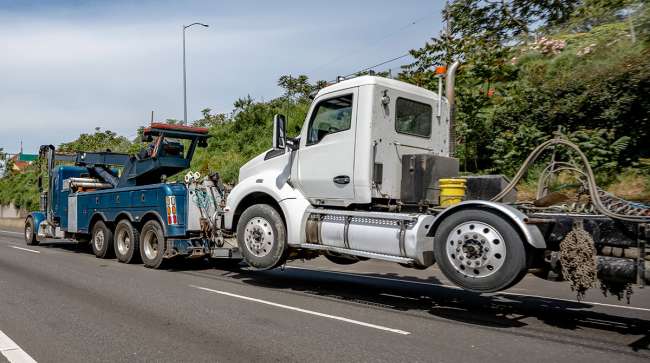Staff Reporter
New Mississippi Law Targets Predatory Towers

[Stay on top of transportation news: Get TTNews in your inbox.]
Mississippi lawmakers dealt a blow to predatory towing companies that target heavy trucks with a new law that will take effect July 1.
Gov. Tate Reeves on April 19 signed an expansive new law that not only will regulate nonconsensual towing and charges for commercial motor vehicles but also creates an advisory board, establishes a dispute resolution process, requires tow warning signage and bans the use of immobilization devices being placed on heavy trucks except when requested by law enforcement.
Senate Bill 2635 was sponsored in the Legislature by Sen. Jenifer Branning (R), an attorney and business owner who chairs the Highways and Transportation Committee and is vice chair of the Government Structure Committee. The bill then passed easily in the state House of Representatives and was approved unchallenged in Senate.
The advisory committee will set maximum towing rates and review invoice disputes, among other things, while working to protect reputable towing companies. New disciplinary procedures to be created for violations by towing and recovery service companies will include suspension or removal of approved companies from law enforcement tow lists.

Miller
“Predatory towing is an egregious practice that not only disrupts our state’s supply chain, but also costs Mississippi truck owners thousands of dollars for each unwanted tow,” said Hal Miller, president of the Mississippi Trucking Association. “We are grateful to Mississippi legislators for listening to our concerns about this unfair tactic, and we thank Gov. Reeves for swiftly signing this bill into law. We look forward to our continued partnership with our state’s leaders on common-sense reforms that promote justice, fairness and safety.”
MTA and the Mississippi Towing Association provided recommendations when the legislation was being drafted.
Trucking's Impact
In Mississippi, the trucking industry plays a significant role in the economy and employs 82,000 workers. More than 85% of Mississippi communities rely exclusively on trucks to receive goods.
The new law also mandates that a towing company before connecting a commercial motor vehicle to a tow truck for a nonconsensual tow must document the vehicle’s condition and reason for the tow and take at least four photographs of the vehicle from specific angles.
Another provision aimed at law enforcement officers lists a series of actions they are prohibited from taking while on duty and involved in a towing incident. Specifically, it will be illegal for them to receive any compensation or incentive while recommending a towing company while on duty, or from having a financial interest in a towing company.

Spear
“Predatory towing companies that hold equipment and cargo hostage with inflated, excessive and fraudulent invoices tarnish the reputation of the entire towing sector. They have taken advantage of the trucking industry for far too long, and we refuse to continue making these ransom payments any longer,” American Trucking Associations President Chris Spear said in reaction to the law. “ATA’s federation of state associations is prepared to fight back against unscrupulous companies that target our industry by injecting more accountability and fairness in state and local laws pertaining to towing.”
The law is scheduled to sunset July 1, 2029.
On March 22, Florida Gov. Ron DeSantis signed a bill reforming predatory practices that had been championed by the Florida Trucking Association. Alix Miller, CEO of FTA, hailed the new legislation as “a huge victory for trucking in Florida, the trucking industry nationally, who have seen invoices as high as $200,000, and the motoring public, who fall victim to predatory towing companies.”
ATRI Study: Causes and Countermeasures of Predatory Towing
A recent study by the American Transportation Research Institute determined that the most common predatory towing practices are charging excessive rates (experienced by nearly 83% of motor carriers) and unnecessary extra service charges (which happened to eight out of 10 carriers). A majority of carriers encountered other abusive towing practices such as truck releases/access delays, truck seizures without cause, tows misreported as consensual and delays in cargo releases.
Want more news? Listen to today's daily briefing below or go here for more info:




